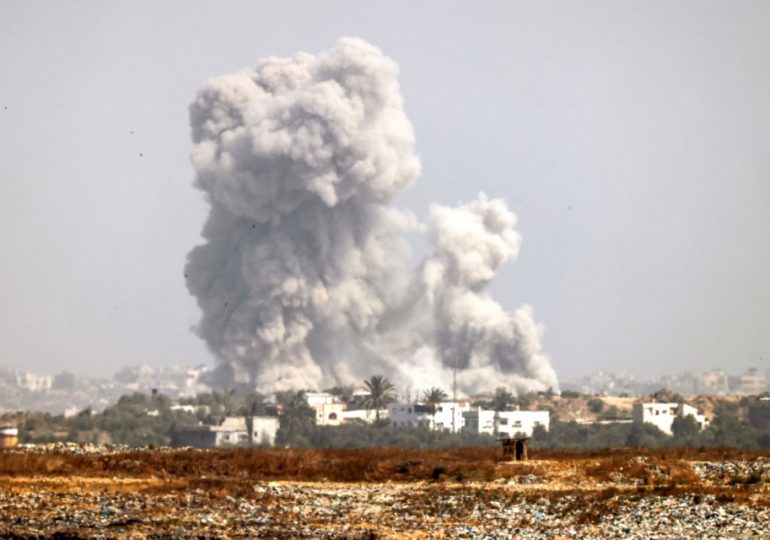ISRAELI prime minister Benjamin Netanyahu has dubbed Joe Biden’s calls for a ceasefire in Gaza a “nonstarter” as he faces unrest at home.
The US president made an unusual address on Friday, outlining three steps in an Israeli proposal to end the fighting in the war-torn strip.
AFPSmoke billows from an Israeli air strike in the Gaza Strip on May 21[/caption]
EPAIsraeli military vehicles mass at the border with the Gaza Strip[/caption]
APIsraeli prime minister Benjamin Netanyahu has come under fire from his people and fellow politicians[/caption]
ReutersUS president Joe Biden laid out a ceasefire deal on Friday[/caption]
But Netanyahu’s office yesterday said they do not completely agree with the US leader’s interpretation.
The PM hit back that any deal on the table is a “nonstarter” if Israel’s conditions for ending the war are not met – including the total annihilation of Hamas.
Meanwhile the Israeli leader faces turmoil in government from far-right politicians who have pushed a harder stance in Gaza for almost eight months.
Biden’s unexpected The White House announcement of the ceasefire proposal sparked backlash from the same ministers, who threatened to bring down Netanyahu’s regime.
Ben-Gvir, national security minister, sad last night that his own party would rather “dissolve the government” than accept “a victory to terrorism”.
And Bezalel Smotrich, the finance minister, said he would “not be part of a government that will agree to the proposed outline”.
Netanyahu’s own citizens have also risen up in protest with mass marches in Tel Aviv to lobby for the hostages’ return.
Mass protests in the capital yesterday saw people demanding Netanyahu’s resignation and an immediate ceasefire.
The notion that Israel will agree to a permanent ceasefire before these conditions are fulfilled is a non-starter
Benajmin Netanyahu’s office
Following Biden’s statement, Netanyahu confirmed a proposal had been put forward by Israel – but said it would “enable Israel to continue the war until all its objectives are achieved”.
This, he warned, would include “the destruction of Hamas’s military and governing capabilities”.
On Saturday morning Netanyahu’s office released another statement doubling down on Israel’s plans for the war.
It read: “Israel’s conditions for ending the war have not changed: the destruction of Hamas’s military and governing capabilities, the freeing of all hostages and ensuring that Gaza no longer poses a threat to Israel.
“Under the proposal, Israel will continue to insist these conditions are met before a permanent ceasefire is put in place.
“The notion that Israel will agree to a permanent ceasefire before these conditions are fulfilled is a non-starter.”
Sources from the prime minister’s office told Sky that they do not “wholly recognise or agree with” the deal laid out by Biden last week.
Chief Israeli foreign policy adviser Ophir Falk told The Times that Biden had made “a political speech for whatever reasons”.
He said: “There are a lot of details to be worked out and that includes there will not be a permanent ceasefire until all our objectives are met.”
GettyProtesters in Tel Aviv march against Netanyahu’s government yesterday – calling for his resignation[/caption]
GettyThousands of Israelis gather with Israeli flags and banners to demand a ceasefire in Gaza[/caption]
Joe Biden’s Ceasefire announcement
BY Ellie Doughty, Foreign News Reporter
ON Friday 31 May, US president Joe Biden gave a surprising speech where he laid out a three-phase ceasefire proposal Israel had apparently presented to Hamas.
The three stages are:
ONE: A “full and complete ceasefire”
Lasting six weeks, Israeli forces would withdraw from all densely populated parts of Gaza.
Hamas would release an unspecified number of Israeli hostages – and those of other nationalities – in exchange for Palestinian prisoners.
Gazans would be able to return home and humanitarian aid would be flooded into the Strip – with some 600 trucks each day.
During this phase, Hamas and Israel would negotiate a permanent end to the fighting – with the ceasefire lasting as long as necessary to reach that agreement.
TWO: A “permanent end to hostilities”
This would see all remaining living Israeli hostages – including soldiers – released.
Israel would withdraw all of its military presence from the Gaza Strip.
Biden said a “number of details” would have to be ironed out in order to move from the first to the second phase.
THREE: Major reconstruction of the Gaza Strip
The Palestinian enclave has been all but completely destroyed in the almost eight months of war.
Israeli troops have covered most of the area and intense fighting with Hamas terrorists along with constant airstrikes have blitzed the land to rubble in most areas.
The final phase of this ceasefire deal would see the land reconstructed – which will likely take decades.
Additionally any final remains of hostages who died in the Strip would be returned to their families.
Biden’s speech comes at an all-time high for global tension and criticism surrounding the fighting in Gaza.
Israel took control of the Rafah border crossing three weeks ago, marking a new escalation as they vowed to invade the refugee area to weed out Hamas.
Ben-Gvir warned in April: “If the prime minister decides to end the war without a large-scale offensive in Rafah to defeat Hamas, he will not have a mandate to continue serving as prime minister.”
Although the Israeli Defence Forces (IDF) claim to have eliminated terrorist targets during fighting in Rafah – Palestinian civilians sheltering have also been killed.
On May 26 an Israeli airstrike hit Tel al Sultan – an area where Gazans had been told it was safe to shelter and were living in tents.
Netanyahu’s government faced swift and fierce criticism for the lethal blow, which sparked a huge blaze in the refugee camp.
Some were burned alive in their tents while hundreds more were wounded.
Horrific images of those injured picking through the rubble for the remains of their relatives, and later for food, swept across the world.
Prime Minister Benjamin Netanyahu admitted the next day it was “a tragic accident” as the EU warned it could impose economic sanctions.
Israeli forces later claimed that Hamas ammunition near to the refugee camp was actually responsible for the strike.
Biden’s ceasefire speech came just several days later.
The Hamas-run health ministry in Gaza has said at least 36,379 people have been killed in the Strip so far – including 95 in the last 24 hours.
They also say over 82,000 have been injured.
Israel said over 1,200 citizens were killed during Hamas’ October 7 massacre, and claim nearly 300 soldiers have died in the Strip.
An Israeli airstrike sparked a fire in a Palestinian refugee camp on May 26
Leave a comment








